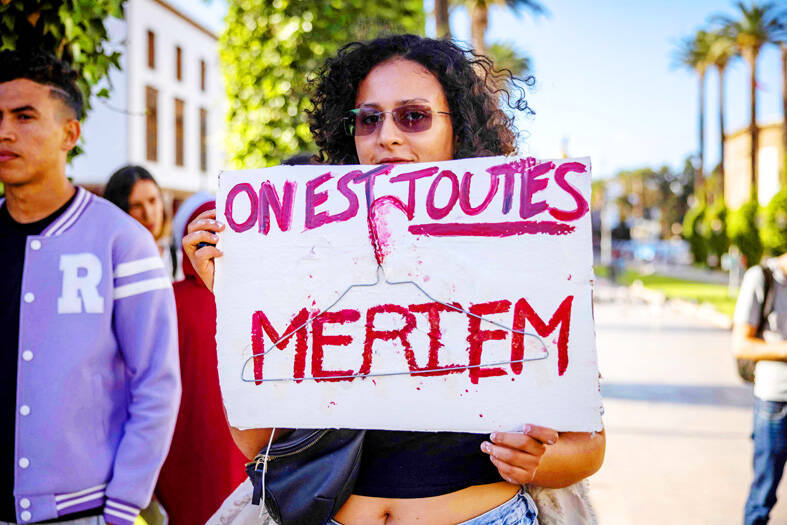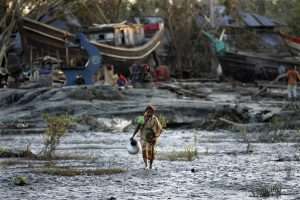Abortion Challenges for Morocco’s Women

Up to 800 illegal abortions with as many as 24 unwanted babies abandoned on rubbish sites each day, illegal abortion casts a shadow over Morocco’s claims that it has advanced in women’s rights
By Elisabeth R. Myers and Martin R. Jay
When 14-year old ‘Meriem’ died of an illegal abortion in September after being raped in a rural village, Moroccan women protested in the streets of Morocco’s capital Rabat bringing abortion once again to the forefront of demands for Moroccan women’s rights.
Abortion in Morocco is a crime for which Moroccan women can face up to two years in jail; those assisting them can receive a five-year prison term. Article 453 of Morocco’s Criminal Code, a law dating back to 1963, currently prohibits abortion unless a doctor or surgeon considers that the mother’s health is at risk, and even in such a case, the provision requires the husband’s consent.
The Moroccan Association for the Fight Against Clandestine Abortion (AMLAC) estimates Morocco’s abortion rate at somewhere between 600-800 a day, which on an annual basis means that anywhere from 220,000 to 300,000 women per year are at risk from unsafe abortions.
Dr. Chafik Chraibi, an obstetrician and gynecologist and founder of AMLAC, who has advocated for abortion reform for 30 years, told Maghrebi that in Morocco today abortions are performed in conditions that are simply not up to proper medical standards. Although about two-thirds are done in doctor’s offices, he said “they are typically under substandard conditions of hygiene and anesthesia and in the absence of an operating room in the case of complications.”
He pointed out that doctor’s office abortions are only available to those women and girls who can afford to go to a doctor. For those who can’t, they have to resort to the traditional “back alley” abortions done the “old-fashioned” way. That is “even worse,” he said, because the complications can be “serious or even fatal.”
In March, 2015, recognizing abortion as a continuing major public health problem, King Mohamed VI ordered the ministers of Islamic Affairs and Justice to confer with Islamic scholars and human rights organizations and propose a new abortion law. Two months later, after what they called “extensive consultations,” the Ministers and the President of the National Human Rights Council (all men) presented the results to the King, recommending that abortion remain a criminal offence except in cases where there are serious health, psychological and social repercussions on women, the family, the fetus, and the whole society.
While this standard was encouraging in its breadth to abortion advocates, the specific examples of exceptions recommended in the report included only where pregnancy endangers the life and health of the mother; is caused by rape or incest; or where there is a fetal abnormality or incurable disease. Spousal consent was not addressed.
The King subsequently directed the preparation of a draft law reflecting the findings and respecting “the precepts of Islam and the values of moderation [and] openness of Moroccan society.” He also highlighted the need for public awareness and prevention through education, an extraordinary statement in a country where it is taboo to talk about sex, and where extramarital sex–even in a case of rape–can land a woman (but not usually a man) in prison.
A year later in 2016, a bill to amend the law retaining abortion as a criminal offence, and codifying only the three limited exceptions for incest, rape, and fetal abnormalities, was subsequently withdrawn without explanation.
Now, six years later, another child rape victim, whose life might have been saved by the amendment, has died. In response to the protests over Meriem’s death, the Moroccan government announced that it would review certain articles of the penal code, while reserving melodramatically that it would be complicated to change the entire penal code.
All deaths preventable
But that is not necessary, according to Dr. Chraibi. Only one amendment to the penal code is needed, he said. That is to amend Article 453 to provide that abortion “will not be punished where it is necessary to preserve the life or the health of the mother [as] defined by the World Health Organization [to include] her physical, mental, and social well-being.”
The World Health Organization issued new guidelines in March of this year to help protect the health of more than 25 million women and girls around the world ever year who face unsafe abortions. “Nearly every death and injury that results from unsafe abortion is entirely preventable,” stated Craig Lissner, acting Director for Sexual and Reproductive Health and Research at WHO.
The impacts of the lack of access to safe abortion are what motivated Dr. Chraibi to become a crusader for safe and legal abortion. “I often saw the complications that arrived at the hospital as a result of illegal abortions: hemorrhaging, infections, acute poisoning,” said Chraibi. He rattled off a litany of other consequences such as suicide attempts, honor crimes, and young pregnant girls being thrown out of their homes by their parents, not to mention abandoned babies and infanticide.
He said when women and girls asked for abortions at hospitals in cases of rape, incest, fetal abnormalities, and other serious problems, “Unfortunately, we could do nothing. The only solution was to legalize abortion.”
Chraibi deems the situation now an “emergency” calling for immediate action. Morocco, “just like all other countries in the world, has a problem of unintended pregnancies, but 95% of all countries in the world have legal abortion. By legalizing abortion, Morocco can show the world a certain level of development–that we are evolving and modernizing,” said Dr. Chraibi. “Legalizing abortion protects the health of women.”
Full legalization of abortion is likely a long way off for Morocco. But there is hope, perhaps, even after seven years of delay. The family law known as the Moudawana has already been reformed in several areas. One change was spurred by the death of a 16-year-old girl who was raped and then committed suicide after being forced to marry her rapist. That provision allowing a rapist to escape prosecution by marrying the victim was repealed.
Journalist pardoned, education is key
In 2019, King Mohammed VI issued an extraordinary pardon in the case of human rights defender and journalist Hajar Raissouni. She had been arrested, charged, and convicted of having had an illegal abortion and extramarital sex in 2019. She maintained her innocence, but was sentenced to a one-year prison term. Less than a month later, his Majesty pardoned Raissouni, as well as her fiancé and the doctor who was convicted of performing the alleged abortion. Although the pardon was framed in furthering family values, rather than vindicating women’s rights, it was nevertheless unprecedented.
As other countries such as the United States backslide in the area of women’s rights (most notably the US Supreme Court’s reversal of 50 years of women’s reproductive rights under its Dobb’s decision in June), activist Yasmina Benslimane, the founder of youth NGO Politics4Her, told Maghrebi that in a society consumed with the taboo and stigma of hchouma (shame), “we must protect the human rights of women and girls.”
“Criminalizing abortions does not stop them,” said Benslimane. “It only makes them unsafe.” Sex education is “key” to preventing unplanned pregnancies, she said, and it’s high time for Morocco to raise the bar to better protect the health of half its population by making abortion legal.
Morocco’s archaic abortion law is inextricably intertwined with other provisions of the criminal code and family code that disproportionately affect and discriminate against women. Without an effort at real reform, the 2011 Constitution’s promise of women’s equality is just a mirage.
_________
Elisabeth R. Myers is an American lawyer, law professor, and analyst based in Marrakech, Morocco. The former founding Editor-in-Chief of online magazine Inside Arabia, her work focuses on human rights, women’s rights, democracy, and the rule of law. She is the Host of The Tilila Report, a podcast named for and focusing on freedom. On Twitter @semibrief.
Martin Jay is an award winning foreign correspondent who has lived in Kenya, Belgium, Lebanon and Morocco working for all of the major media titles including CNN, Euronews, BBC, DW, TRT, RT and whose investigations and analysis have been published in Newsweek, Sunday Times, New York Times, Daily Mail among others. In 2016 he was awarded the Elizabeth Neuffer Foundation press award given by the UN (UNCA) in New York for his reporting on Syrian refugees in Lebanon. He currently lives in Morocco where he is the founding editor of Maghrebi.org and can be followed on Twitter at @MartinRJay
Want to chase the pulse of North Africa?
Subscribe to receive our FREE weekly PDF magazine














